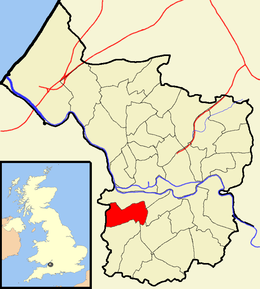Bedminster, Bristol
| Bedminster | |
|---|---|
 Boundaries of the city council ward. |
|
| Bedminster shown within Bristol | |
| Population | 12,448 (2011.Ward) |
| OS grid reference | ST580713 |
| • London | 124m |
| Unitary authority | |
| Region | |
| Country | England |
| Sovereign state | United Kingdom |
| Post town | BRISTOL |
| Postcode district | BS3 |
| Dialling code | 0117 |
| Police | Avon and Somerset |
| Fire | Avon |
| Ambulance | South Western |
| EU Parliament | South West England |
| UK Parliament | |
Bedminster is a district of Bristol, England. It lies on the south side of the city, and is in Somerset. It is also the name of a council ward, which includes the central part of the district and some other areas.
The eastern part of Bedminster is known as Windmill Hill. To the south of Bedminster is high ground known as Bedminster Down, now generally considered a separate suburb. According to the Bristol City Council neighbourhood profiles, the Southville ward is considered part of Bedminster.
Bedminster was once a small town in Somerset. The town's origins seem to be Roman, centred on the present East Street and West Street. Finds here have been interpreted as an enclosed rural farmstead, dating between the 2nd and 4th centuries, but with possible Iron Age origins. The river Malago, which runs through Bedminster to join the Avon, was an early Christian place for baptisms — the old word for which, beydd may be the origin of Bedminster's name. Substantial Roman remains have also been found at Bedminster Down, including plaster, tesserae (hence mosaic floors), sandstone roof tiles, coins and pottery, hence the site is thought to be a Roman Villa occupied by the Romano-British.
By the late Anglo-Saxon period Bedminster was a manor held by King Edward the Confessor in the 11th century, and in the Domesday Book of 1086 was still in royal hands. The Royal Manor of Bedminster comprised all the land south of the Avon, from the Avon Gorge to Brislington, and in the Domesday Book had 25 villeins, 3 slaves and 27 smallholders. In 1154 it was given to the Lords of Berkeley, who kept it for 300 years. In 1605 it was purchased by the Smyth family of Ashton Court who remained the Lords of the Manor until the 19th century.
...
Wikipedia
